【原创】专题15 一般现在时专项训练 100 题(二)-2025中考英语二轮专题复习(答题技巧+题目分类与分层)
文档属性
| 名称 | 【原创】专题15 一般现在时专项训练 100 题(二)-2025中考英语二轮专题复习(答题技巧+题目分类与分层) | 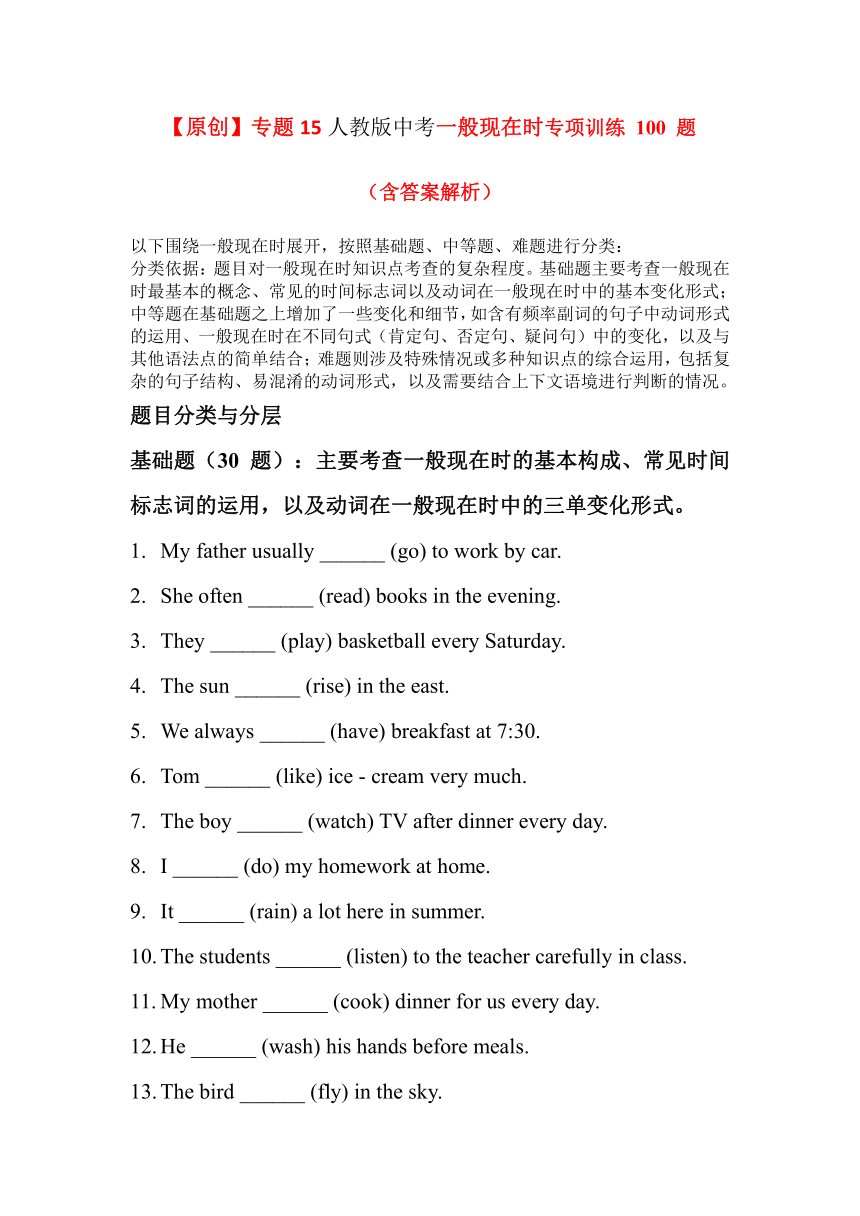 | |
| 格式 | docx | ||
| 文件大小 | 22.3KB | ||
| 资源类型 | 试卷 | ||
| 版本资源 | 人教版 | ||
| 科目 | 英语 | ||
| 更新时间 | 2025-03-01 15:29:38 | ||
图片预览

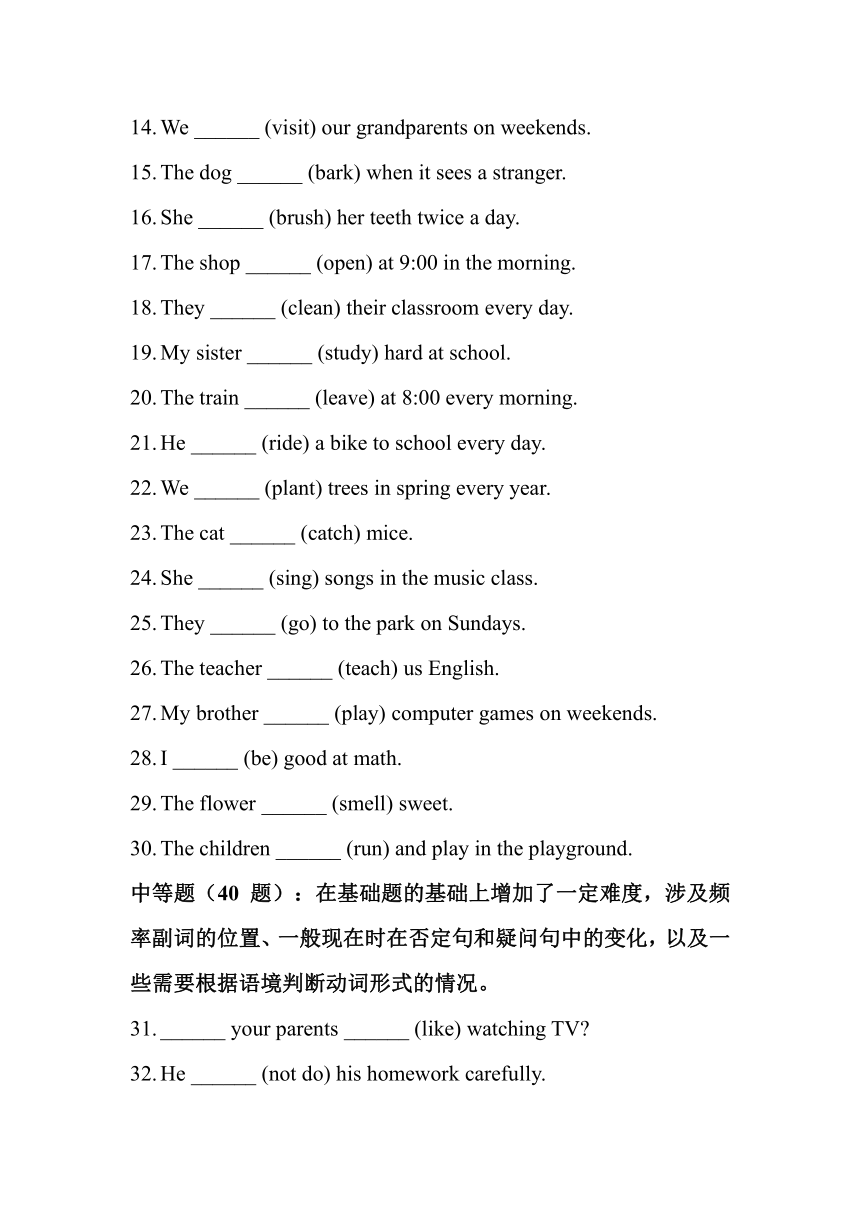
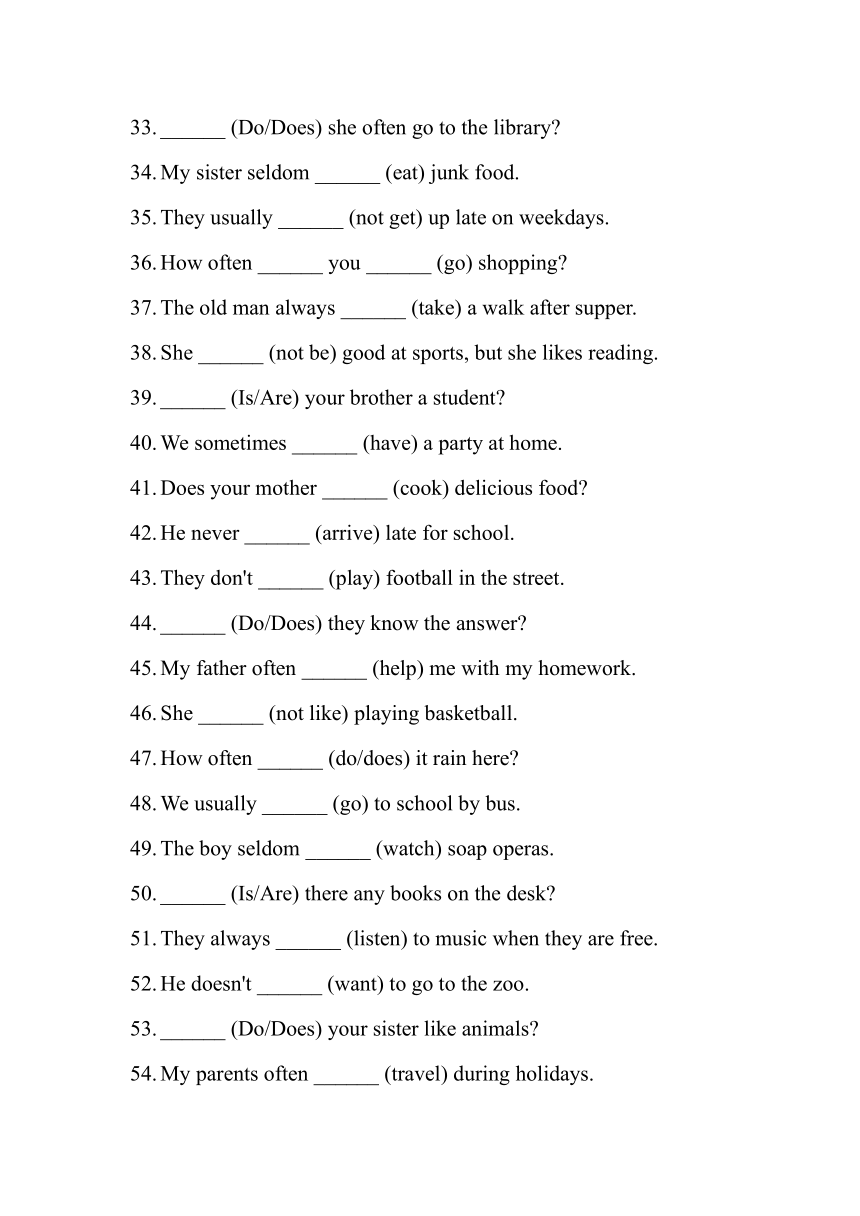
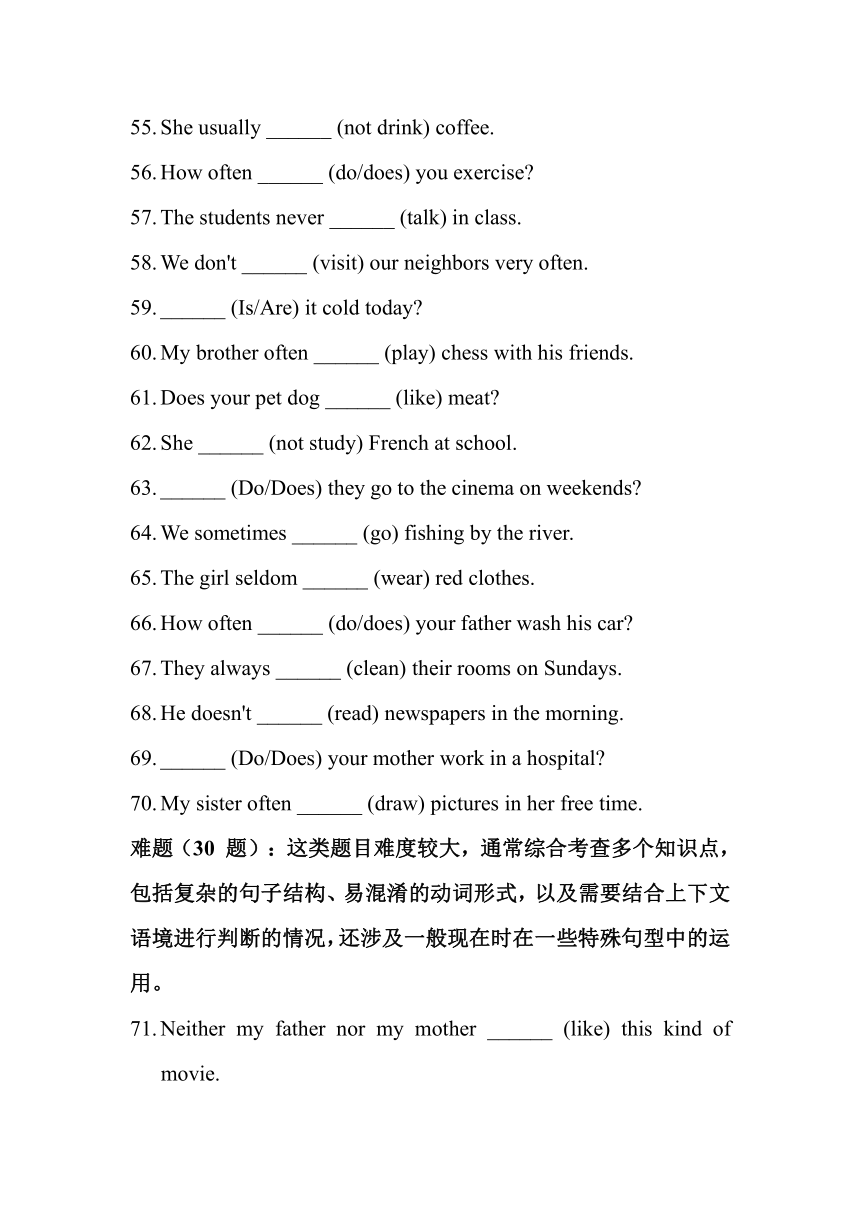
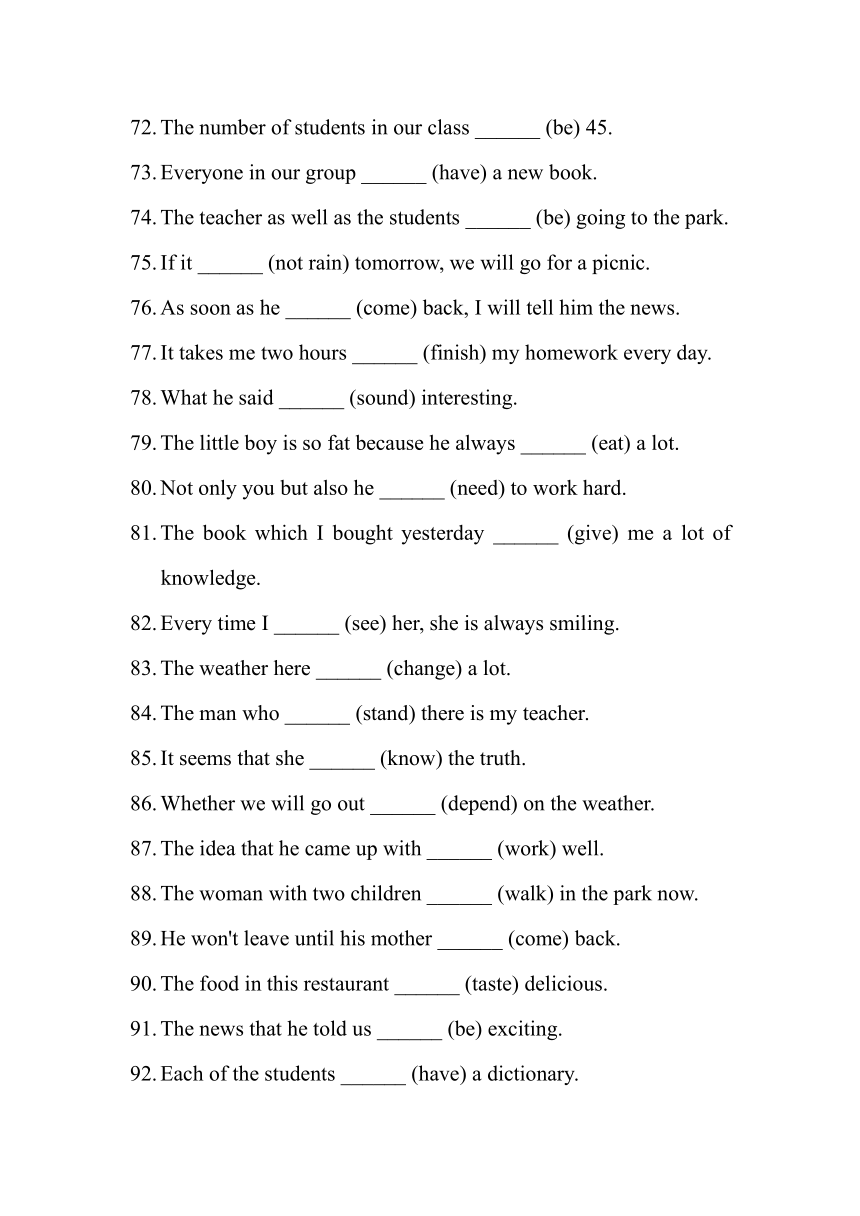
文档简介
【原创】专题15人教版中考一般现在时专项训练 100 题
(含答案解析)
以下围绕一般现在时展开,按照基础题、中等题、难题进行分类:
分类依据:题目对一般现在时知识点考查的复杂程度。基础题主要考查一般现在时最基本的概念、常见的时间标志词以及动词在一般现在时中的基本变化形式;中等题在基础题之上增加了一些变化和细节,如含有频率副词的句子中动词形式的运用、一般现在时在不同句式(肯定句、否定句、疑问句)中的变化,以及与其他语法点的简单结合;难题则涉及特殊情况或多种知识点的综合运用,包括复杂的句子结构、易混淆的动词形式,以及需要结合上下文语境进行判断的情况。
题目分类与分层
基础题(30 题):主要考查一般现在时的基本构成、常见时间标志词的运用,以及动词在一般现在时中的三单变化形式。
My father usually ______ (go) to work by car.
She often ______ (read) books in the evening.
They ______ (play) basketball every Saturday.
The sun ______ (rise) in the east.
We always ______ (have) breakfast at 7:30.
Tom ______ (like) ice - cream very much.
The boy ______ (watch) TV after dinner every day.
I ______ (do) my homework at home.
It ______ (rain) a lot here in summer.
The students ______ (listen) to the teacher carefully in class.
My mother ______ (cook) dinner for us every day.
He ______ (wash) his hands before meals.
The bird ______ (fly) in the sky.
We ______ (visit) our grandparents on weekends.
The dog ______ (bark) when it sees a stranger.
She ______ (brush) her teeth twice a day.
The shop ______ (open) at 9:00 in the morning.
They ______ (clean) their classroom every day.
My sister ______ (study) hard at school.
The train ______ (leave) at 8:00 every morning.
He ______ (ride) a bike to school every day.
We ______ (plant) trees in spring every year.
The cat ______ (catch) mice.
She ______ (sing) songs in the music class.
They ______ (go) to the park on Sundays.
The teacher ______ (teach) us English.
My brother ______ (play) computer games on weekends.
I ______ (be) good at math.
The flower ______ (smell) sweet.
The children ______ (run) and play in the playground.
中等题(40 题):在基础题的基础上增加了一定难度,涉及频率副词的位置、一般现在时在否定句和疑问句中的变化,以及一些需要根据语境判断动词形式的情况。
______ your parents ______ (like) watching TV
He ______ (not do) his homework carefully.
______ (Do/Does) she often go to the library
My sister seldom ______ (eat) junk food.
They usually ______ (not get) up late on weekdays.
How often ______ you ______ (go) shopping
The old man always ______ (take) a walk after supper.
She ______ (not be) good at sports, but she likes reading.
______ (Is/Are) your brother a student
We sometimes ______ (have) a party at home.
Does your mother ______ (cook) delicious food
He never ______ (arrive) late for school.
They don't ______ (play) football in the street.
______ (Do/Does) they know the answer
My father often ______ (help) me with my homework.
She ______ (not like) playing basketball.
How often ______ (do/does) it rain here
We usually ______ (go) to school by bus.
The boy seldom ______ (watch) soap operas.
______ (Is/Are) there any books on the desk
They always ______ (listen) to music when they are free.
He doesn't ______ (want) to go to the zoo.
______ (Do/Does) your sister like animals
My parents often ______ (travel) during holidays.
She usually ______ (not drink) coffee.
How often ______ (do/does) you exercise
The students never ______ (talk) in class.
We don't ______ (visit) our neighbors very often.
______ (Is/Are) it cold today
My brother often ______ (play) chess with his friends.
Does your pet dog ______ (like) meat
She ______ (not study) French at school.
______ (Do/Does) they go to the cinema on weekends
We sometimes ______ (go) fishing by the river.
The girl seldom ______ (wear) red clothes.
How often ______ (do/does) your father wash his car
They always ______ (clean) their rooms on Sundays.
He doesn't ______ (read) newspapers in the morning.
______ (Do/Does) your mother work in a hospital
My sister often ______ (draw) pictures in her free time.
难题(30 题):这类题目难度较大,通常综合考查多个知识点,包括复杂的句子结构、易混淆的动词形式,以及需要结合上下文语境进行判断的情况,还涉及一般现在时在一些特殊句型中的运用。
Neither my father nor my mother ______ (like) this kind of movie.
The number of students in our class ______ (be) 45.
Everyone in our group ______ (have) a new book.
The teacher as well as the students ______ (be) going to the park.
If it ______ (not rain) tomorrow, we will go for a picnic.
As soon as he ______ (come) back, I will tell him the news.
It takes me two hours ______ (finish) my homework every day.
What he said ______ (sound) interesting.
The little boy is so fat because he always ______ (eat) a lot.
Not only you but also he ______ (need) to work hard.
The book which I bought yesterday ______ (give) me a lot of knowledge.
Every time I ______ (see) her, she is always smiling.
The weather here ______ (change) a lot.
The man who ______ (stand) there is my teacher.
It seems that she ______ (know) the truth.
Whether we will go out ______ (depend) on the weather.
The idea that he came up with ______ (work) well.
The woman with two children ______ (walk) in the park now.
He won't leave until his mother ______ (come) back.
The food in this restaurant ______ (taste) delicious.
The news that he told us ______ (be) exciting.
Each of the students ______ (have) a dictionary.
The boy who ______ (wear) glasses is my classmate.
It is important that we ______ (learn) English well.
The movie that we watched last night ______ (be) very interesting.
The song which she often sings ______ (make) me relaxed.
The story that he told ______ (sound) like a fairy tale.
The book that I borrowed from the library ______ (help) me a lot.
The man whose son ______ (study) in our school is a famous doctor.
The girl who ______ (dance) well is my sister.
基础题答案详解
goes:根据 “usually” 可知,句子时态为一般现在时,主语 “My father” 是第三人称单数,所以动词 “go” 要用第三人称单数形式 “goes”。
reads:“often” 表明句子是一般现在时,主语 “She” 是第三人称单数,动词 “read” 变为第三人称单数 “reads”。
play:“every Saturday” 是一般现在时的标志,主语 “They” 是复数,动词用原形 “play”。
rises:“太阳从东方升起” 是客观事实,用一般现在时,主语 “The sun” 是第三人称单数,“rise” 要变为 “rises”。
have:“always” 和 “at 7:30” 提示为一般现在时,主语 “We” 是复数,动词 “have” 用原形。
likes:“Tom” 是第三人称单数,且句子描述喜好,是一般现在时,动词 “like” 变为 “likes”。
watches:“every day” 表明是一般现在时,“The boy” 是第三人称单数,“watch” 的第三人称单数形式是 “watches”。
do:句子描述日常行为,是一般现在时,主语 “I” 是第一人称,动词 “do” 用原形。
rains:“in summer” 表示经常发生的情况,句子是一般现在时,“It” 指代天气,是第三人称单数,“rain” 变为 “rains”。
listen:“in class” 结合语境可知是一般现在时,“The students” 是复数,动词 “listen” 用原形。
cooks:“every day” 说明是一般现在时,“My mother” 是第三人称单数,“cook” 变为 “cooks”。
washes:“before meals” 是一般现在时的时间标志,“He” 是第三人称单数,“wash” 的第三人称单数形式是 “washes”。
flies:描述鸟的习性,用一般现在时,“The bird” 是第三人称单数,“fly” 变为 “flies”。
visit:“on weekends” 表示经常的行为,句子是一般现在时,“We” 是复数,动词 “visit” 用原形。
barks:“when it sees a stranger” 表明是一般现在时,“The dog” 是第三人称单数,“bark” 变为 “barks”。
brushes:“twice a day” 是一般现在时的标志,“She” 是第三人称单数,“brush” 变为 “brushes”。
opens:“at 9:00 in the morning” 说明是一般现在时,“The shop” 是第三人称单数,“open” 变为 “opens”。
clean:“every day” 表明句子是一般现在时,“They” 是复数,动词 “clean” 用原形。
studies:“at school” 结合语境是一般现在时,“My sister” 是第三人称单数,“study” 变为 “studies”。
leaves:“at 8:00 every morning” 是一般现在时的时间标志,“The train” 是第三人称单数,“leave” 变为 “leaves”。
rides:“every day” 表明是一般现在时,“He” 是第三人称单数,“ride” 变为 “rides”。
plant:“in spring every year” 表示经常的行为,句子是一般现在时,“We” 是复数,动词 “plant” 用原形。
catches:描述猫的习性,用一般现在时,“The cat” 是第三人称单数,“catch” 变为 “catches”。
sings:“in the music class” 结合语境是一般现在时,“She” 是第三人称单数,“sing” 变为 “sings”。
go:“on Sundays” 表示经常的行为,句子是一般现在时,“They” 是复数,动词 “go” 用原形。
teaches:“The teacher” 是第三人称单数,且句子描述日常教学,是一般现在时,“teach” 变为 “teaches”。
plays:“on weekends” 表明是一般现在时,“My brother” 是第三人称单数,“play” 变为 “plays”。
am:主语 “I” 与 be 动词搭配用 “am”,句子是一般现在时。
smells:描述花的特性,用一般现在时,“The flower” 是第三人称单数,“smell” 变为 “smells”。
run:“The children” 是复数,且句子描述孩子们日常在操场的行为,是一般现在时,动词 “run” 用原形。
中等题答案详解
Do; like:这是一般现在时的一般疑问句,主语 “your parents” 是复数,借助助动词 “do”,动词 “like” 用原形。
doesn't do:句子是一般现在时的否定句,主语 “He” 是第三人称单数,借助助动词 “doesn't”,动词 “do” 用原形。
Does:主语 “she” 是第三人称单数,在一般现在时的一般疑问句中,借助助动词 “does”。
eats:“seldom” 是频率副词,句子是一般现在时,主语 “My sister” 是第三人称单数,动词 “eat” 变为 “eats”。
don't get:句子是一般现在时的否定句,主语 “They” 是复数,借助助动词 “don't”,动词 “get” 用原形。
do; go:这是一般现在时的特殊疑问句,主语 “you” 是第二人称,借助助动词 “do”,动词 “go” 用原形。
takes:“always” 是频率副词,句子是一般现在时,主语 “The old man” 是第三人称单数,动词 “take” 变为 “takes”。
isn't:主语 “She” 是第三人称单数,在一般现在时中,be 动词用 “is”,否定形式是 “isn't”。
Is:主语 “your brother” 是第三人称单数,在一般现在时的一般疑问句中,be 动词用 “is”。
have:“sometimes” 是频率副词,句子是一般现在时,主语 “We” 是复数,动词 “have” 用原形。
cook:在一般现在时的一般疑问句中,借助助动词 “does” 后,动词 “cook” 用原形。
arrives:“never” 是频率副词,句子是一般现在时,主语 “He” 是第三人称单数,动词 “arrive” 变为 “arrives”。
play:在一般现在时的否定句中,借助助动词 “don't” 后,动词 “play” 用原形。
Do:主语 “They” 是复数,在一般现在时的一般疑问句中,借助助动词 “do”。
helps:“often” 是频率副词,句子是一般现在时,主语 “My father” 是第三人称单数,动词 “help” 变为 “helps”。
doesn't like:句子是一般现在时的否定句,主语 “She” 是第三人称单数,借助助动词 “doesn't”,动词 “like” 用原形。
does:主语 “it” 是第三人称单数,在一般现在时的特殊疑问句中,借助助动词 “does”。
go:“usually” 是频率副词,句子是一般现在时,主语 “We” 是复数,动词 “go” 用原形。
watches:“seldom” 是频率副词,句子是一般现在时,主语 “The boy” 是第三人称单数,动词 “watch” 变为 “watches”。
Are:“there be” 句型中,“books” 是复数,在一般现在时的一般疑问句中,be 动词用 “are”。
listen:“always” 是频率副词,句子是一般现在时,主语 “They” 是复数,动词 “listen” 用原形。
want:在一般现在时的否定句中,借助助动词 “doesn't” 后,动词 “want” 用原形。
Does:主语 “your sister” 是第三人称单数,在一般现在时的一般疑问句中,借助助动词 “does”。
travel:“often” 是频率副词,句子是一般现在时,主语 “My parents” 是复数,动词 “travel” 用原形。
doesn't drink:句子是一般现在时的否定句,主语 “She” 是第三人称单数,借助助动词 “doesn't”,动词 “drink” 用原形。
do:主语 “you” 是第二人称,在一般现在时的特殊疑问句中,借助助动词 “do”。
talk:“never” 是频率副词,句子是一般现在时,主语 “The students” 是复数,动词 “talk” 用原形。
visit:在一般现在时的否定句中,借助助动词 “don't” 后,动词 “visit” 用原形。
Is:主语 “it” 是第三人称单数,在一般现在时的一般疑问句中,be 动词用 “is”
plays:“often” 表明句子时态为一般现在时,主语 “My brother” 是第三人称单数,所以动词 “play” 要用第三人称单数形式 “plays”
like:在一般现在时的一般疑问句中,借助助动词 “does” 后,动词要用原形,所以此处填 “like”。
doesn't study:句子为一般现在时的否定句,主语 “She” 是第三人称单数,借助助动词 “doesn't”,动词 “study” 用原形,故填 “doesn't study”。
Do:主语 “They” 是复数,在一般现在时的一般疑问句中,借助助动词 “do” ,所以填 “Do”。
go:“sometimes” 表示句子时态是一般现在时,主语 “We” 是复数,动词 “go” 用原形,因此填 “go”。
wears:“seldom” 说明句子是一般现在时,主语 “The girl” 是第三人称单数,动词 “wear” 变为第三人称单数形式 “wears”。
does:主语 “your father” 是第三人称单数,在一般现在时的特殊疑问句中,借助助动词 “does”,所以填 “does”。
clean:“always” 和 “on Sundays” 表明句子为一般现在时,主语 “They” 是复数,动词 “clean” 用原形,即填 “clean”。
read:在一般现在时的否定句中,借助助动词 “doesn't” 后,动词 “read” 用原形,所以此处填 “read”。
Does:主语 “your mother” 是第三人称单数,在一般现在时的一般疑问句中,借助助动词 “does”,故填 “Does”。
draws:“often” 表明句子是一般现在时,主语 “My sister” 是第三人称单数,动词 “draw” 变为第三人称单数形式 “draws”
难题答案详解
likes:“neither...nor...” 连接两个主语时,谓语动词遵循 “就近原则”,靠近谓语的 “my mother” 是第三人称单数,所以动词 “like” 用第三人称单数形式 “likes” 。
is:“the number of...” 表示 “…… 的数量”,作主语时,谓语动词用单数形式,所以用 “is”。
has:“everyone” 作主语时,谓语动词用第三人称单数形式,句子时态是一般现在时,所以 “have” 变为 “has”。
is:“as well as” 连接两个主语时,谓语动词与前面的主语保持一致,“The teacher” 是第三人称单数,所以 be 动词用 “is”。
doesn't rain:本句是 if 引导的条件状语从句,遵循 “主将从现” 原则,从句用一般现在时表示将来。主语 “it” 是第三人称单数,否定句借助助动词 “doesn't”,动词 “rain” 用原形。
comes:“as soon as” 引导时间状语从句,同样遵循 “主将从现” 原则,从句主语 “he” 是第三人称单数,动词 “come” 变为第三人称单数形式 “comes”。
to finish:“It takes sb. some time to do sth.” 是固定句型,表示 “做某事花费某人多长时间”,所以此处用动词不定式 “to finish”。
sounds:“What he said” 作主语,视为单数概念,句子时态是一般现在时,所以 “sound” 用第三人称单数形式 “sounds”。
eats:“always” 表明句子是一般现在时,主语 “he” 是第三人称单数,动词 “eat” 变为第三人称单数形式 “eats”。
needs:“not only...but also...” 连接两个主语时,谓语动词遵循 “就近原则”,靠近谓语的 “he” 是第三人称单数,所以动词 “need” 用第三人称单数形式 “needs”。
gives:“which I bought yesterday” 是定语从句,修饰先行词 “The book”,句子时态是一般现在时,“The book” 是第三人称单数,所以动词 “give” 用第三人称单数形式 “gives”。
see:“every time” 引导时间状语从句,句子时态是一般现在时,主语 “I” 是第一人称,动词 “see” 用原形。
changes:句子描述这里天气的经常性特点,是一般现在时,主语 “The weather” 是第三人称单数,动词 “change” 变为第三人称单数形式 “changes”。
stands:“who...there” 是定语从句,修饰先行词 “The man”,句子时态是一般现在时,“The man” 是第三人称单数,所以动词 “stand” 用第三人称单数形式 “stands”。
knows:“It seems that...” 句型中,从句时态根据具体情况而定,此处描述现在的情况,用一般现在时。主语 “she” 是第三人称单数,动词 “know” 变为第三人称单数形式 “knows”。
depends:“Whether we will go out” 是主语从句,作主语时视为单数概念,句子时态是一般现在时,所以动词 “depend” 用第三人称单数形式 “depends”。
works:“that he came up with” 是定语从句,修饰先行词 “The idea”,句子时态是一般现在时,“The idea” 是第三人称单数,所以动词 “work” 用第三人称单数形式 “works”。
is walking:“The woman with two children” 中,“with two children” 是伴随状语,主语是 “The woman”,是第三人称单数。“now” 表明动作正在进行,用现在进行时 “be + 动词现在分词”,所以填 “is walking”。但题目主要考查一般现在时相关知识,此处可理解为在一般现在时的语境下描述此刻的动作。
comes:“until” 引导时间状语从句,遵循 “主将从现” 原则,从句主语 “his mother” 是第三人称单数,动词 “come” 变为第三人称单数形式 “comes”。
tastes:句子描述这家餐厅食物的特性,是一般现在时,主语 “The food” 是不可数名词,视为第三人称单数,动词 “taste” 变为第三人称单数形式 “tastes”。
is:“that he told us” 是定语从句,修饰先行词 “The news”,“news” 是不可数名词,视为第三人称单数,句子时态是一般现在时,所以 be 动词用 “is”。
has:“each of...” 作主语时,谓语动词用第三人称单数形式,句子时态是一般现在时,所以 “have” 变为 “has”。
wears:“who...glasses” 是定语从句,修饰先行词 “The boy”,句子时态是一般现在时,“The boy” 是第三人称单数,所以动词 “wear” 用第三人称单数形式 “wears”。
learn:“It is important that...” 句型中,that 引导的从句要用虚拟语气,即 “should + 动词原形”,“should” 可以省略,所以此处填 “learn”。在一般现在时的语法范畴内,这种虚拟语气形式也可看作一种特殊情况。
was:“that we watched last night” 是定语从句,修饰先行词 “The movie”,“last night” 表明句子描述过去的事情,要用一般过去时,“The movie” 是单数,所以 be 动词用 “was”。但从一般现在时知识拓展角度,可对比不同时态下句子的变化。
makes:“which she often sings” 是定语从句,修饰先行词 “The song”,句子时态是一般现在时,“The song” 是第三人称单数,所以动词 “make” 用第三人称单数形式 “makes”。
sounds:“that he told” 是定语从句,修饰先行词 “The story”,句子时态是一般现在时,“The story” 是第三人称单数,所以动词 “sound” 用第三人称单数形式 “sounds”。
helps:“that I borrowed from the library” 是定语从句,修饰先行词 “The book”,句子时态是一般现在时,“The book” 是第三人称单数,所以动词 “help” 用第三人称单数形式 “helps”。
studies:“whose son...in our school” 是定语从句,修饰先行词 “The man”,从句中主语 “son” 是第三人称单数,句子时态是一般现在时,所以动词 “study” 用第三人称单数形式 “studies”。
dances:“who...well” 是定语从句,修饰先行词 “The girl”,句子时态是一般现在时,“The girl” 是第三人称单数,所以动词 “dance” 用第三人称单数形式 “dances”。
(含答案解析)
以下围绕一般现在时展开,按照基础题、中等题、难题进行分类:
分类依据:题目对一般现在时知识点考查的复杂程度。基础题主要考查一般现在时最基本的概念、常见的时间标志词以及动词在一般现在时中的基本变化形式;中等题在基础题之上增加了一些变化和细节,如含有频率副词的句子中动词形式的运用、一般现在时在不同句式(肯定句、否定句、疑问句)中的变化,以及与其他语法点的简单结合;难题则涉及特殊情况或多种知识点的综合运用,包括复杂的句子结构、易混淆的动词形式,以及需要结合上下文语境进行判断的情况。
题目分类与分层
基础题(30 题):主要考查一般现在时的基本构成、常见时间标志词的运用,以及动词在一般现在时中的三单变化形式。
My father usually ______ (go) to work by car.
She often ______ (read) books in the evening.
They ______ (play) basketball every Saturday.
The sun ______ (rise) in the east.
We always ______ (have) breakfast at 7:30.
Tom ______ (like) ice - cream very much.
The boy ______ (watch) TV after dinner every day.
I ______ (do) my homework at home.
It ______ (rain) a lot here in summer.
The students ______ (listen) to the teacher carefully in class.
My mother ______ (cook) dinner for us every day.
He ______ (wash) his hands before meals.
The bird ______ (fly) in the sky.
We ______ (visit) our grandparents on weekends.
The dog ______ (bark) when it sees a stranger.
She ______ (brush) her teeth twice a day.
The shop ______ (open) at 9:00 in the morning.
They ______ (clean) their classroom every day.
My sister ______ (study) hard at school.
The train ______ (leave) at 8:00 every morning.
He ______ (ride) a bike to school every day.
We ______ (plant) trees in spring every year.
The cat ______ (catch) mice.
She ______ (sing) songs in the music class.
They ______ (go) to the park on Sundays.
The teacher ______ (teach) us English.
My brother ______ (play) computer games on weekends.
I ______ (be) good at math.
The flower ______ (smell) sweet.
The children ______ (run) and play in the playground.
中等题(40 题):在基础题的基础上增加了一定难度,涉及频率副词的位置、一般现在时在否定句和疑问句中的变化,以及一些需要根据语境判断动词形式的情况。
______ your parents ______ (like) watching TV
He ______ (not do) his homework carefully.
______ (Do/Does) she often go to the library
My sister seldom ______ (eat) junk food.
They usually ______ (not get) up late on weekdays.
How often ______ you ______ (go) shopping
The old man always ______ (take) a walk after supper.
She ______ (not be) good at sports, but she likes reading.
______ (Is/Are) your brother a student
We sometimes ______ (have) a party at home.
Does your mother ______ (cook) delicious food
He never ______ (arrive) late for school.
They don't ______ (play) football in the street.
______ (Do/Does) they know the answer
My father often ______ (help) me with my homework.
She ______ (not like) playing basketball.
How often ______ (do/does) it rain here
We usually ______ (go) to school by bus.
The boy seldom ______ (watch) soap operas.
______ (Is/Are) there any books on the desk
They always ______ (listen) to music when they are free.
He doesn't ______ (want) to go to the zoo.
______ (Do/Does) your sister like animals
My parents often ______ (travel) during holidays.
She usually ______ (not drink) coffee.
How often ______ (do/does) you exercise
The students never ______ (talk) in class.
We don't ______ (visit) our neighbors very often.
______ (Is/Are) it cold today
My brother often ______ (play) chess with his friends.
Does your pet dog ______ (like) meat
She ______ (not study) French at school.
______ (Do/Does) they go to the cinema on weekends
We sometimes ______ (go) fishing by the river.
The girl seldom ______ (wear) red clothes.
How often ______ (do/does) your father wash his car
They always ______ (clean) their rooms on Sundays.
He doesn't ______ (read) newspapers in the morning.
______ (Do/Does) your mother work in a hospital
My sister often ______ (draw) pictures in her free time.
难题(30 题):这类题目难度较大,通常综合考查多个知识点,包括复杂的句子结构、易混淆的动词形式,以及需要结合上下文语境进行判断的情况,还涉及一般现在时在一些特殊句型中的运用。
Neither my father nor my mother ______ (like) this kind of movie.
The number of students in our class ______ (be) 45.
Everyone in our group ______ (have) a new book.
The teacher as well as the students ______ (be) going to the park.
If it ______ (not rain) tomorrow, we will go for a picnic.
As soon as he ______ (come) back, I will tell him the news.
It takes me two hours ______ (finish) my homework every day.
What he said ______ (sound) interesting.
The little boy is so fat because he always ______ (eat) a lot.
Not only you but also he ______ (need) to work hard.
The book which I bought yesterday ______ (give) me a lot of knowledge.
Every time I ______ (see) her, she is always smiling.
The weather here ______ (change) a lot.
The man who ______ (stand) there is my teacher.
It seems that she ______ (know) the truth.
Whether we will go out ______ (depend) on the weather.
The idea that he came up with ______ (work) well.
The woman with two children ______ (walk) in the park now.
He won't leave until his mother ______ (come) back.
The food in this restaurant ______ (taste) delicious.
The news that he told us ______ (be) exciting.
Each of the students ______ (have) a dictionary.
The boy who ______ (wear) glasses is my classmate.
It is important that we ______ (learn) English well.
The movie that we watched last night ______ (be) very interesting.
The song which she often sings ______ (make) me relaxed.
The story that he told ______ (sound) like a fairy tale.
The book that I borrowed from the library ______ (help) me a lot.
The man whose son ______ (study) in our school is a famous doctor.
The girl who ______ (dance) well is my sister.
基础题答案详解
goes:根据 “usually” 可知,句子时态为一般现在时,主语 “My father” 是第三人称单数,所以动词 “go” 要用第三人称单数形式 “goes”。
reads:“often” 表明句子是一般现在时,主语 “She” 是第三人称单数,动词 “read” 变为第三人称单数 “reads”。
play:“every Saturday” 是一般现在时的标志,主语 “They” 是复数,动词用原形 “play”。
rises:“太阳从东方升起” 是客观事实,用一般现在时,主语 “The sun” 是第三人称单数,“rise” 要变为 “rises”。
have:“always” 和 “at 7:30” 提示为一般现在时,主语 “We” 是复数,动词 “have” 用原形。
likes:“Tom” 是第三人称单数,且句子描述喜好,是一般现在时,动词 “like” 变为 “likes”。
watches:“every day” 表明是一般现在时,“The boy” 是第三人称单数,“watch” 的第三人称单数形式是 “watches”。
do:句子描述日常行为,是一般现在时,主语 “I” 是第一人称,动词 “do” 用原形。
rains:“in summer” 表示经常发生的情况,句子是一般现在时,“It” 指代天气,是第三人称单数,“rain” 变为 “rains”。
listen:“in class” 结合语境可知是一般现在时,“The students” 是复数,动词 “listen” 用原形。
cooks:“every day” 说明是一般现在时,“My mother” 是第三人称单数,“cook” 变为 “cooks”。
washes:“before meals” 是一般现在时的时间标志,“He” 是第三人称单数,“wash” 的第三人称单数形式是 “washes”。
flies:描述鸟的习性,用一般现在时,“The bird” 是第三人称单数,“fly” 变为 “flies”。
visit:“on weekends” 表示经常的行为,句子是一般现在时,“We” 是复数,动词 “visit” 用原形。
barks:“when it sees a stranger” 表明是一般现在时,“The dog” 是第三人称单数,“bark” 变为 “barks”。
brushes:“twice a day” 是一般现在时的标志,“She” 是第三人称单数,“brush” 变为 “brushes”。
opens:“at 9:00 in the morning” 说明是一般现在时,“The shop” 是第三人称单数,“open” 变为 “opens”。
clean:“every day” 表明句子是一般现在时,“They” 是复数,动词 “clean” 用原形。
studies:“at school” 结合语境是一般现在时,“My sister” 是第三人称单数,“study” 变为 “studies”。
leaves:“at 8:00 every morning” 是一般现在时的时间标志,“The train” 是第三人称单数,“leave” 变为 “leaves”。
rides:“every day” 表明是一般现在时,“He” 是第三人称单数,“ride” 变为 “rides”。
plant:“in spring every year” 表示经常的行为,句子是一般现在时,“We” 是复数,动词 “plant” 用原形。
catches:描述猫的习性,用一般现在时,“The cat” 是第三人称单数,“catch” 变为 “catches”。
sings:“in the music class” 结合语境是一般现在时,“She” 是第三人称单数,“sing” 变为 “sings”。
go:“on Sundays” 表示经常的行为,句子是一般现在时,“They” 是复数,动词 “go” 用原形。
teaches:“The teacher” 是第三人称单数,且句子描述日常教学,是一般现在时,“teach” 变为 “teaches”。
plays:“on weekends” 表明是一般现在时,“My brother” 是第三人称单数,“play” 变为 “plays”。
am:主语 “I” 与 be 动词搭配用 “am”,句子是一般现在时。
smells:描述花的特性,用一般现在时,“The flower” 是第三人称单数,“smell” 变为 “smells”。
run:“The children” 是复数,且句子描述孩子们日常在操场的行为,是一般现在时,动词 “run” 用原形。
中等题答案详解
Do; like:这是一般现在时的一般疑问句,主语 “your parents” 是复数,借助助动词 “do”,动词 “like” 用原形。
doesn't do:句子是一般现在时的否定句,主语 “He” 是第三人称单数,借助助动词 “doesn't”,动词 “do” 用原形。
Does:主语 “she” 是第三人称单数,在一般现在时的一般疑问句中,借助助动词 “does”。
eats:“seldom” 是频率副词,句子是一般现在时,主语 “My sister” 是第三人称单数,动词 “eat” 变为 “eats”。
don't get:句子是一般现在时的否定句,主语 “They” 是复数,借助助动词 “don't”,动词 “get” 用原形。
do; go:这是一般现在时的特殊疑问句,主语 “you” 是第二人称,借助助动词 “do”,动词 “go” 用原形。
takes:“always” 是频率副词,句子是一般现在时,主语 “The old man” 是第三人称单数,动词 “take” 变为 “takes”。
isn't:主语 “She” 是第三人称单数,在一般现在时中,be 动词用 “is”,否定形式是 “isn't”。
Is:主语 “your brother” 是第三人称单数,在一般现在时的一般疑问句中,be 动词用 “is”。
have:“sometimes” 是频率副词,句子是一般现在时,主语 “We” 是复数,动词 “have” 用原形。
cook:在一般现在时的一般疑问句中,借助助动词 “does” 后,动词 “cook” 用原形。
arrives:“never” 是频率副词,句子是一般现在时,主语 “He” 是第三人称单数,动词 “arrive” 变为 “arrives”。
play:在一般现在时的否定句中,借助助动词 “don't” 后,动词 “play” 用原形。
Do:主语 “They” 是复数,在一般现在时的一般疑问句中,借助助动词 “do”。
helps:“often” 是频率副词,句子是一般现在时,主语 “My father” 是第三人称单数,动词 “help” 变为 “helps”。
doesn't like:句子是一般现在时的否定句,主语 “She” 是第三人称单数,借助助动词 “doesn't”,动词 “like” 用原形。
does:主语 “it” 是第三人称单数,在一般现在时的特殊疑问句中,借助助动词 “does”。
go:“usually” 是频率副词,句子是一般现在时,主语 “We” 是复数,动词 “go” 用原形。
watches:“seldom” 是频率副词,句子是一般现在时,主语 “The boy” 是第三人称单数,动词 “watch” 变为 “watches”。
Are:“there be” 句型中,“books” 是复数,在一般现在时的一般疑问句中,be 动词用 “are”。
listen:“always” 是频率副词,句子是一般现在时,主语 “They” 是复数,动词 “listen” 用原形。
want:在一般现在时的否定句中,借助助动词 “doesn't” 后,动词 “want” 用原形。
Does:主语 “your sister” 是第三人称单数,在一般现在时的一般疑问句中,借助助动词 “does”。
travel:“often” 是频率副词,句子是一般现在时,主语 “My parents” 是复数,动词 “travel” 用原形。
doesn't drink:句子是一般现在时的否定句,主语 “She” 是第三人称单数,借助助动词 “doesn't”,动词 “drink” 用原形。
do:主语 “you” 是第二人称,在一般现在时的特殊疑问句中,借助助动词 “do”。
talk:“never” 是频率副词,句子是一般现在时,主语 “The students” 是复数,动词 “talk” 用原形。
visit:在一般现在时的否定句中,借助助动词 “don't” 后,动词 “visit” 用原形。
Is:主语 “it” 是第三人称单数,在一般现在时的一般疑问句中,be 动词用 “is”
plays:“often” 表明句子时态为一般现在时,主语 “My brother” 是第三人称单数,所以动词 “play” 要用第三人称单数形式 “plays”
like:在一般现在时的一般疑问句中,借助助动词 “does” 后,动词要用原形,所以此处填 “like”。
doesn't study:句子为一般现在时的否定句,主语 “She” 是第三人称单数,借助助动词 “doesn't”,动词 “study” 用原形,故填 “doesn't study”。
Do:主语 “They” 是复数,在一般现在时的一般疑问句中,借助助动词 “do” ,所以填 “Do”。
go:“sometimes” 表示句子时态是一般现在时,主语 “We” 是复数,动词 “go” 用原形,因此填 “go”。
wears:“seldom” 说明句子是一般现在时,主语 “The girl” 是第三人称单数,动词 “wear” 变为第三人称单数形式 “wears”。
does:主语 “your father” 是第三人称单数,在一般现在时的特殊疑问句中,借助助动词 “does”,所以填 “does”。
clean:“always” 和 “on Sundays” 表明句子为一般现在时,主语 “They” 是复数,动词 “clean” 用原形,即填 “clean”。
read:在一般现在时的否定句中,借助助动词 “doesn't” 后,动词 “read” 用原形,所以此处填 “read”。
Does:主语 “your mother” 是第三人称单数,在一般现在时的一般疑问句中,借助助动词 “does”,故填 “Does”。
draws:“often” 表明句子是一般现在时,主语 “My sister” 是第三人称单数,动词 “draw” 变为第三人称单数形式 “draws”
难题答案详解
likes:“neither...nor...” 连接两个主语时,谓语动词遵循 “就近原则”,靠近谓语的 “my mother” 是第三人称单数,所以动词 “like” 用第三人称单数形式 “likes” 。
is:“the number of...” 表示 “…… 的数量”,作主语时,谓语动词用单数形式,所以用 “is”。
has:“everyone” 作主语时,谓语动词用第三人称单数形式,句子时态是一般现在时,所以 “have” 变为 “has”。
is:“as well as” 连接两个主语时,谓语动词与前面的主语保持一致,“The teacher” 是第三人称单数,所以 be 动词用 “is”。
doesn't rain:本句是 if 引导的条件状语从句,遵循 “主将从现” 原则,从句用一般现在时表示将来。主语 “it” 是第三人称单数,否定句借助助动词 “doesn't”,动词 “rain” 用原形。
comes:“as soon as” 引导时间状语从句,同样遵循 “主将从现” 原则,从句主语 “he” 是第三人称单数,动词 “come” 变为第三人称单数形式 “comes”。
to finish:“It takes sb. some time to do sth.” 是固定句型,表示 “做某事花费某人多长时间”,所以此处用动词不定式 “to finish”。
sounds:“What he said” 作主语,视为单数概念,句子时态是一般现在时,所以 “sound” 用第三人称单数形式 “sounds”。
eats:“always” 表明句子是一般现在时,主语 “he” 是第三人称单数,动词 “eat” 变为第三人称单数形式 “eats”。
needs:“not only...but also...” 连接两个主语时,谓语动词遵循 “就近原则”,靠近谓语的 “he” 是第三人称单数,所以动词 “need” 用第三人称单数形式 “needs”。
gives:“which I bought yesterday” 是定语从句,修饰先行词 “The book”,句子时态是一般现在时,“The book” 是第三人称单数,所以动词 “give” 用第三人称单数形式 “gives”。
see:“every time” 引导时间状语从句,句子时态是一般现在时,主语 “I” 是第一人称,动词 “see” 用原形。
changes:句子描述这里天气的经常性特点,是一般现在时,主语 “The weather” 是第三人称单数,动词 “change” 变为第三人称单数形式 “changes”。
stands:“who...there” 是定语从句,修饰先行词 “The man”,句子时态是一般现在时,“The man” 是第三人称单数,所以动词 “stand” 用第三人称单数形式 “stands”。
knows:“It seems that...” 句型中,从句时态根据具体情况而定,此处描述现在的情况,用一般现在时。主语 “she” 是第三人称单数,动词 “know” 变为第三人称单数形式 “knows”。
depends:“Whether we will go out” 是主语从句,作主语时视为单数概念,句子时态是一般现在时,所以动词 “depend” 用第三人称单数形式 “depends”。
works:“that he came up with” 是定语从句,修饰先行词 “The idea”,句子时态是一般现在时,“The idea” 是第三人称单数,所以动词 “work” 用第三人称单数形式 “works”。
is walking:“The woman with two children” 中,“with two children” 是伴随状语,主语是 “The woman”,是第三人称单数。“now” 表明动作正在进行,用现在进行时 “be + 动词现在分词”,所以填 “is walking”。但题目主要考查一般现在时相关知识,此处可理解为在一般现在时的语境下描述此刻的动作。
comes:“until” 引导时间状语从句,遵循 “主将从现” 原则,从句主语 “his mother” 是第三人称单数,动词 “come” 变为第三人称单数形式 “comes”。
tastes:句子描述这家餐厅食物的特性,是一般现在时,主语 “The food” 是不可数名词,视为第三人称单数,动词 “taste” 变为第三人称单数形式 “tastes”。
is:“that he told us” 是定语从句,修饰先行词 “The news”,“news” 是不可数名词,视为第三人称单数,句子时态是一般现在时,所以 be 动词用 “is”。
has:“each of...” 作主语时,谓语动词用第三人称单数形式,句子时态是一般现在时,所以 “have” 变为 “has”。
wears:“who...glasses” 是定语从句,修饰先行词 “The boy”,句子时态是一般现在时,“The boy” 是第三人称单数,所以动词 “wear” 用第三人称单数形式 “wears”。
learn:“It is important that...” 句型中,that 引导的从句要用虚拟语气,即 “should + 动词原形”,“should” 可以省略,所以此处填 “learn”。在一般现在时的语法范畴内,这种虚拟语气形式也可看作一种特殊情况。
was:“that we watched last night” 是定语从句,修饰先行词 “The movie”,“last night” 表明句子描述过去的事情,要用一般过去时,“The movie” 是单数,所以 be 动词用 “was”。但从一般现在时知识拓展角度,可对比不同时态下句子的变化。
makes:“which she often sings” 是定语从句,修饰先行词 “The song”,句子时态是一般现在时,“The song” 是第三人称单数,所以动词 “make” 用第三人称单数形式 “makes”。
sounds:“that he told” 是定语从句,修饰先行词 “The story”,句子时态是一般现在时,“The story” 是第三人称单数,所以动词 “sound” 用第三人称单数形式 “sounds”。
helps:“that I borrowed from the library” 是定语从句,修饰先行词 “The book”,句子时态是一般现在时,“The book” 是第三人称单数,所以动词 “help” 用第三人称单数形式 “helps”。
studies:“whose son...in our school” 是定语从句,修饰先行词 “The man”,从句中主语 “son” 是第三人称单数,句子时态是一般现在时,所以动词 “study” 用第三人称单数形式 “studies”。
dances:“who...well” 是定语从句,修饰先行词 “The girl”,句子时态是一般现在时,“The girl” 是第三人称单数,所以动词 “dance” 用第三人称单数形式 “dances”。
同课章节目录
- 词法
- 名词
- 动词和动词短语
- 动词语态
- 动词时态
- 助动词和情态动词
- 非谓语动词
- 冠词
- 代词
- 数词和量词
- 形容词副词及其比较等级
- 介词和介词短语
- 连词和感叹词
- 构词法
- 相似、相近词比较
- 句法
- 陈述句
- 一般疑问句和否定疑问句
- 特殊疑问句及选择疑问句
- 反意疑问句
- 存在句(There be句型)
- 宾语从句
- 定语从句
- 状语从句
- 主谓一致问题
- 简单句
- 并列句
- 复合句
- 主谓一致
- 主、表语从句
- 名词性从句
- 直接引语和间接引语
- 虚拟语气
- 感叹句
- 强调句
- 倒装句
- 祈使句
- 句子的成分
- 句子的分类
- 题型专区
- 单项选择部分
- 易错题
- 完形填空
- 阅读理解
- 词汇练习
- 听说训练
- 句型转换
- 补全对话
- 短文改错
- 翻译
- 书面表达
- 任务型阅读
- 语法填空
- 其他资料
